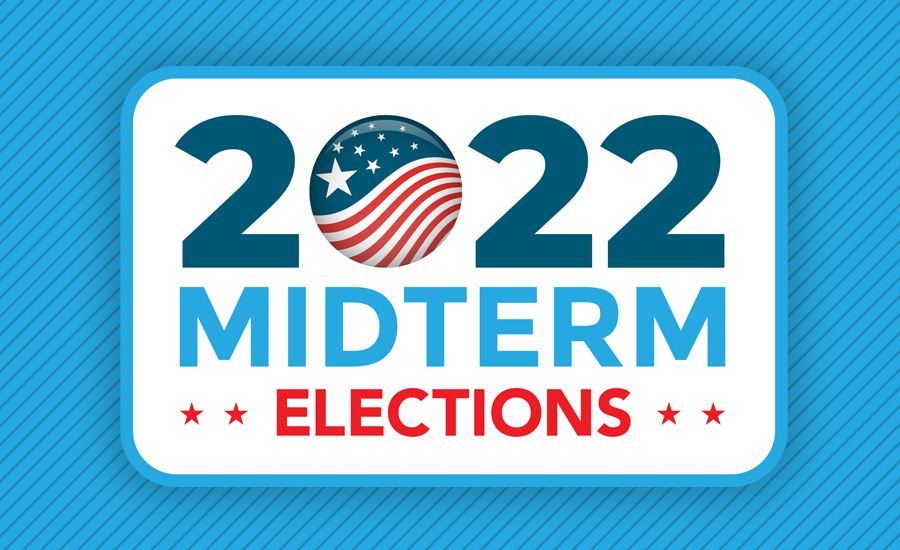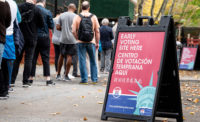As Election Day approaches, construction industry executives will be keenly tracking outcomes not only of key U.S. House and Senate and state and local races, but also results for important project funding measures and other ballot issues in several states.
By far the largest of the statewide bond measures before voters on Nov. 8 is a proposed New York state authorization to issue $4.2 billion in bonds to fund clean energy, resilience, wastewater treatment and other green projects throughout the Empire State.
Proposition One—the Clean Water, Clean Air and Green Jobs Environmental Bond Act—was approved earlier by the legislature but requires voter approval of bonds to fund its programs.
The bond measure has the backing of a long list of environmental organizations, as well as labor unions and some contractor groups. A recent poll shows voters support the bond proposal by a wide margin.
The measure’s $4.2 billion for capital projects includes up to $1.5 billion for “climate change mitigation;” at least $1.1 billion for restoration and flood-risk reduction; up to $650 million for land conservation and recreation; and at least $650 million for “water quality improvement and resilient infrastructure,” according to a New York State Board of Elections summary.
Julie Tighe, president of the New York League of Conservation Voters, says Proposition 1 is the first state environmental bond measure since 1996 and represents its largest environmental investment to date.
A leader of the coalition pushing for the measure’s approval, she said in an interview that the $1.1 billion for reducing flood risks addresses “a big issue for the state of New York.” Every county in the state has had a flood-related disaster declaration in the past 10 years, she said, although noting that the measure does not specify allocations to individual projects.
Encouraging Poll Numbers
Signals look positive for the bond measure. Results from a Siena College poll released Oct. 18 showed that 54% of those polled support the environmental bond act, 26% oppose it and 20% are categorized as “other,” “no vote” or undecided.
“We feel pretty strongly that this is going to pass. But we’re not taking anything for granted,” Tighe says. The coalition, which includes more than 200 groups, has launched what she refers to as a multimillion-dollar campaign to push for the measure's approval.
Organized labor, including building trades unions, is heavily involved in the bond campaign. Patrick Purcell, executive director of the New York State Laborers-Employers Cooperation and Education Trust, said the measure "is critically important to our union and our membership.”
Purcell said in comments emailed to ENR that it would create nearly 100,000 jobs and make “much-needed and long-overdue improvements to our infrastructure.”
He points to several pro-union provisions in the legislation, including prevailing-wage requirements on projects that receive funds from the new bonds and apprenticeship requirements for those valued at $50 million or more.
The measure also gives owners of private projects funded by the bonds the choice of opting out of the prevailing-wage mandates by entering into a project labor agreement, Purcell says.
Other States Have Notable Measures
Elsewhere around the country, other Election Day bond issues include several in New Mexico, according to a National Conference of State Legislatures database. They include $216 million for public higher education, special public schools and tribal schools. Also on state ballots are $24.7 million for senior citizen facilities and $19.3 million for public libraries.
In Rhode Island, voters will consider proposals to issue $250 million in bonds to construct and renovate public school buildings and $100 million in bonds for the University of Rhode Island’s Narragansett Bay campus.
Non-bond statewide ballot measures include a proposed California initiative calling for a tax on income of more than $2 million, to fund zero-emissions vehicles and wildfire prevention.
In Massachusetts, voters will consider a proposed 4% tax on incomes of more than $1 million, with proceeds to go to “public education, public colleges and universities” and “repair and maintenance of roads, bridges and public transportation,” according to the office of the Secretary of the Commonwealth.
Other state ballot measures deal with labor issues. Illinois voters will consider a referendum on a proposed amendment to create a state constitutional right to collective bargaining, says the state legislatures group.
Tennessee voters will decide the fate of a proposed "right to work" amendment to the state constitution that would make it illegal to require mandatory labor union membership for workers as a condition of employment.





Post a comment to this article
Report Abusive Comment